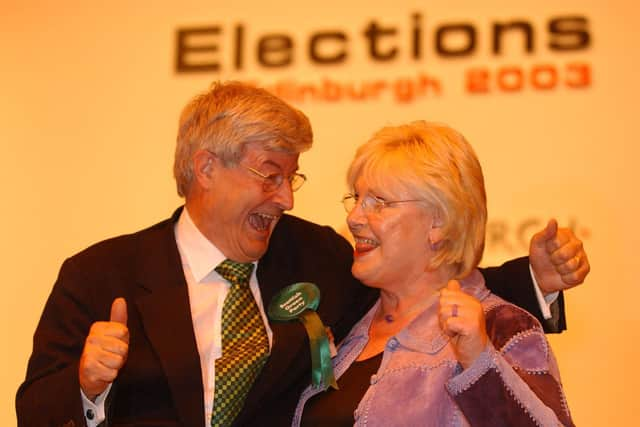Is Scotland's 'rainbow parliament' of 2003 set to make a comeback? – Ian Swanson
and live on Freeview channel 276
SNP support has fallen in the wake of Nicola Sturgeon’s resignation and the astonishing events which have unfolded since – and polling guru Professor Sir John Curtice says Labour could now be "close to neck and neck" with the nationalists.
That could prove crucial in determining who wins next year's general election. It’s still three years until the next Holyrood election, so the picture can change before then, but the current drama surrounding the SNP and the questions it raises are not going to be forgotten quickly. So as the SNP's sway over Scottish politics begins to recede, what happens next?
Advertisement
Hide AdAdvertisement
Hide AdScotland has a strange history of one-party dominance in its politics. Labour had almost unchallengeable control at all levels of government for about 50 years until it was ousted by the SNP, which then established a similar supremacy. Edinburgh East SNP MP Tommy Sheppard likened the wholesale switch of allegiance by Scottish voters to a flock of starlings suddenly changing direction en masse.


But it is worth remembering that 20 years ago this week, Scotland elected a "rainbow parliament" with MSPs from a wider range of parties than seen before or since. The 2003 Scottish Parliament election was only the second since devolution. The first, in 1999, had seen Labour returned as the biggest party but without an overall majority and therefore it formed a coalition government with the Lib Dems, while the SNP became the main opposition.
In 2003, both Labour and the SNP lost seats, though the Tories’ and Lib Dems’ numbers were unchanged, while smaller parties made big gains. The Greens had had one MSP in the first parliament, but now they had seven; the Scottish Socialist Party expanded from one MSP to six; the Scottish Senior Citizens Party won a seat, as did the Save Stobhill Hospital campaign; the independent Dennis Canavan, first elected in 1999, won again; and Margo MacDonald, who had quit the SNP, was elected as an independent MSP for Lothian. And during the parliament, the number of independents was boosted when the SNP and the Tories each expelled one of their MSPs.
Labour and the Lib Dems still had enough MSPs to continue as a majority coalition and the SNP remained the main opposition, but the result was seen as a blow to the two biggest parties and a signal that Scotland was willing to listen to smaller parties, support single-issue campaigners and back independent-minded politicians who turned their back on the party whip. The new parliament might have been taking a more multi-party European shape rather than the traditional Westminster model.
Advertisement
Hide AdAdvertisement
Hide AdBut things changed again at the next Holyrood election in 2007, when the Greens were reduced back to two MSPs, the Scottish Socialists lost all their seats, the hospital campaigner and the pensioners’ representative were both defeated and Dennis Canavan stood down, leaving Margo MacDonald as the only independent. A close finish was predicted between Labour and the SNP, which may have persuaded voters they should choose between these two.
But the rainbow parliament had been a welcome flowering of political diversity. It may not happen again in quite the same way, but a move away from one dominant party in the parliament – of whatever colour – might well be regarded by many as a healthy development.
Comment Guidelines
National World encourages reader discussion on our stories. User feedback, insights and back-and-forth exchanges add a rich layer of context to reporting. Please review our Community Guidelines before commenting.